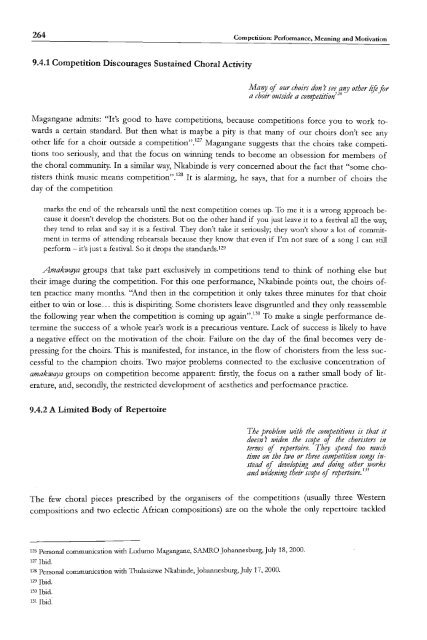South African Choral Music (Amakwaya): Song, Contest and the ...
South African Choral Music (Amakwaya): Song, Contest and the ...
South African Choral Music (Amakwaya): Song, Contest and the ...
Create successful ePaper yourself
Turn your PDF publications into a flip-book with our unique Google optimized e-Paper software.
264 Competition: Perfonnance, Meaning <strong>and</strong> Motivation<br />
9.4.1 Competition Discourages Sustained <strong>Choral</strong> Activity<br />
Ma'!Y of our choirs don i see a'!Y o<strong>the</strong>r lifefor<br />
a choir outside a competition 126<br />
Magangane admits: "It's good to have competitions, because competitions force you to work to<br />
wards a certain st<strong>and</strong>ard. But <strong>the</strong>n what is maybe a pity is that many of our choirs don't see any<br />
o<strong>the</strong>r life for a choir outside a competition".127 Magangane suggests that <strong>the</strong> choirs take competi<br />
tions too seriously, <strong>and</strong> that <strong>the</strong> focus on winning tends to become an obsession for members of<br />
<strong>the</strong> choral community. In a similar way, Nkabinde is very concerned about <strong>the</strong> fact that "some cho<br />
risters think music means competition".128 It is alarming, he says, that for a number of choirs <strong>the</strong><br />
day of <strong>the</strong> competition<br />
marks <strong>the</strong> end of <strong>the</strong> rehearsals until <strong>the</strong> next competition comes up. To me it is a wrong approach because<br />
it doesn't develop <strong>the</strong> choristers. But on <strong>the</strong> o<strong>the</strong>r h<strong>and</strong> if you just leave it to a festival all <strong>the</strong> way,<br />
<strong>the</strong>y tend to relax <strong>and</strong> say it is a festivaL They don't take it seriously; <strong>the</strong>y won't show a lot of commitment<br />
in terms of attending rehearsals because <strong>the</strong>y know that even if I'm not sure of a song I can still<br />
perform - it's just a festivaL So it drops <strong>the</strong> st<strong>and</strong>ards.l29<br />
Amakwqya groups that take part exclusively in competitions tend to think of nothing else but<br />
<strong>the</strong>ir image during <strong>the</strong> competition. For this one performance, Nkabinde points out, <strong>the</strong> choirs of<br />
ten practice many months. ''And <strong>the</strong>n in <strong>the</strong> competition it only takes three minutes for that choir<br />
ei<strong>the</strong>r to win or lose... this is dispiriting. Some choristers leave disgruntled <strong>and</strong> <strong>the</strong>y only reassemble<br />
<strong>the</strong> following year when <strong>the</strong> competition is coming up again".130 To make a single performance determine<br />
<strong>the</strong> success of a whole year's work is a precarious venture. Lack of success is likely to have<br />
a negative effect on <strong>the</strong> motivation of <strong>the</strong> choir. Failure on <strong>the</strong> day of <strong>the</strong> final becomes very de<br />
pressing for <strong>the</strong> choirs. This is manifested, for instance, in <strong>the</strong> flow of choristers from <strong>the</strong> less suc<br />
cessful to <strong>the</strong> champion choirs. Two major problems connected to <strong>the</strong> exclusive concentration of<br />
amakwqya groups on competition become apparent: firstly, <strong>the</strong> focus on a ra<strong>the</strong>r small body of lit<br />
erature, <strong>and</strong>, secondly, <strong>the</strong> restricted development of aes<strong>the</strong>tics <strong>and</strong> performance practice.<br />
9.4.2 A Limited Body of Repertoire<br />
The problem with <strong>the</strong> competitions is that it<br />
doesn i widen <strong>the</strong> scope of <strong>the</strong> choristers in<br />
terms of repertoire. Thry spend too much<br />
time on <strong>the</strong> two or three competition songs instead<br />
of developing <strong>and</strong> dOing o<strong>the</strong>r works<br />
<strong>and</strong> widening tlieir scope of repertoire. 131<br />
The few choral pieces prescribed by <strong>the</strong> organisers of <strong>the</strong> competitions (usually three Western<br />
compositions <strong>and</strong> two eclectic <strong>African</strong> compositions) are on <strong>the</strong> whole <strong>the</strong> only repertoire tackled<br />
126 Personal communication with Ludumo Magangane, SAMRO Johannesburg, July 18, 2000.<br />
127 Ibid.<br />
128 Personal communication with Thulasizwe Nkabinde, Johannesburg, July 17, 2000.<br />
129 Ibid.<br />
130 Ibid.<br />
131 Ibid.

















